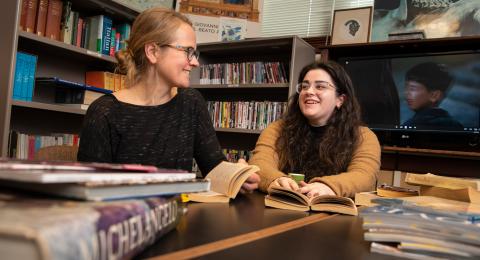The Italian major at UNH offers students the chance to explore Italy's influential art, cuisine, literature, and cinema while gaining proficiency in the language and culture. Italy is a significant political and economic power with the seventh largest economy in the world, and a student's ability to speak Italian strengthens their employability upon graduation. The program encourages independent thinking and research, preparing students to thrive in a global community. Opportunities include internships and a study-abroad program in Rome.
What is Italian studies?
As a student majoring in Italian, you’ll learn why Italy’s art, food, literature and cinema have such a large and lasting impact on culture worldwide. While you’re at it, you’ll gain proficiency in Italian, which is spoken as a second language by 250 million people. Italy is a major political and economic force in Europe and beyond and possesses the world’s seventh largest economy. Many employers seek people who speak both Italian and English. An estimated 7,500 American companies do business with Italy, and more than 1,000 U.S. firms have offices there.
Why study Italian at UNH?
The Italian studies degree program provides opportunities both to achieve high competency in Italian language and culture and to apply these knowledge skills to other disciplines. The program encourages independent and innovative thinking and research so that students can pursue and achieve their goals while preparing for the challenges of thriving in the world community. Our internship and study-abroad opportunities in Italy include a program in Rome.
Potential careers
- Business leader
- College professor
- Diplomat
- Interpreter
- Journalist
- Language teacher
- Nonprofit administrator
- Public relations professional
- Tour guide
- Translator
Curriculum & Requirements
The Italian studies program offers courses in Italian language, culture, literature, history and cinema, as well as courses on Italian American culture. The program provides opportunities both to achieve high competence in Italian language and culture and to apply these knowledge skills to other disciplines. The Italian studies program encourages independent and innovative thinking and research so that students may pursue and achieve individualized goals while they prepare for the challenges of thriving in the world community.
Sample Degree Plan
This sample degree plan serves as a general guide; students collaborate with their academic advisor to develop a personalized degree plan to meet their academic goals and program requirements.
| First Year | ||
|---|---|---|
| Fall | Credits | |
| ENGL 401 | First-Year Writing | 4 |
| ITAL 401 | Elementary Italian I | 4 |
| ITAL 444 Course 1 | 4 | |
| Discovery Course 1 | 4 | |
| Credits | 16 | |
| Spring | ||
| ITAL 402 | Elementary Italian II | 4 |
| Discovery Course 1 | 4 | |
| Discovery Course 1 | 4 | |
| Elective/Major/Minor Course 1 | 4 | |
| Credits | 16 | |
| Second Year | ||
| Fall | ||
| ITAL 503 | Intermediate Italian I | 4 |
| ITAL 525 | Italian Cinema | 4 |
| Discovery Course 1 | 4 | |
| Elective/Minor Course 1 | 4 | |
| Credits | 16 | |
| Spring | ||
| ITAL 504 | Intermediate Italian II | 4 |
| Discovery Course 1 | 4 | |
| Discovery Course 1 | 4 | |
| Elective/Minor Course 1 | 4 | |
| Credits | 16 | |
| Third Year | ||
| Fall | ||
| ITAL 631 | Advanced Conversation and Composition I | 4 |
| Discovery Course 1 | 4 | |
| Discovery Course 1 | 4 | |
| Elective/Minor Course 1 | 4 | |
| Credits | 16 | |
| Spring | ||
| ITAL 632 | Advanced Conversation and Composition II | 4 |
| Discovery Course 1 | 4 | |
| Discovery Course 1 | 4 | |
| Elective/Minor Course 1 | 4 | |
| Credits | 16 | |
| Fourth Year | ||
| Fall | ||
| ITAL 635 | Italian Food Studies (or other 600-level italian culture course) | 4 |
| Elective: Advanced italian language course 1 | 4 | |
| Elective/Minor Course 1 | 4 | |
| Elective/Minor Course 1 | 4 | |
| Credits | 16 | |
| Spring | ||
| ITAL 701W | Capstone Course | 4 |
| Elective/Minor Course 1 | 4 | |
| Elective/Minor Course 1 | 4 | |
| Elective/Minor Course 1 | 4 | |
| Credits | 16 | |
| Total Credits | 128 | |
- 1
Course selected in consultation with advisor.
Degree Requirements
All Major, Option and Elective Requirements as indicated.
*Major GPA requirements as indicated.
Major Requirements
- The Italian studies major curriculum consists of 10 courses (40 credits).
- The minimum grade for each major course is a C.
- Once students declare the Italian studies major, they must maintain a 2.5 cumulative grade point average in order to fulfill the study abroad requirement.
-
Italian studies majors may use two major-required courses to satisfy two Discovery category requirements.
| Code | Title | Credits |
|---|---|---|
| Required Courses | ||
| Select 16 credits at 600-level or above | 16 | |
| Electives | ||
| Select 24 credits in ITAL course electives (up to two courses in Classics (CLAS), Humanities (HUMA) or from the list of approved electives may substitute for two of these courses.) | 24 | |
| Discovery Capstone | ||
| Select one of the following capstone requirements: | ||
ITAL 701W | Capstone Course | |
ITAL 796 | Independent Study in Italian Language and Literature (Honors Thesis) | |
ITAL 795 | Independent Study in Italian Language and Literature (Senior Thesis) | |
ITAL course at the 700-level (ITAL 733 or ITAL 775) | ||
ITAL 595 | Practicum (Advisor approved 4-credit internship) | |
INCO 685 | Study Abroad (Advisor approved semester immersion experience in Italy) | |
or INCO 686 | Study Abroad | |
| Total Credits | 40 | |
Electives
Approval by the Italian studies advisor is required for elective courses not listed below.
| Code | Title | Credits |
|---|---|---|
| Elective Courses | ||
| All Classics (CLAS) and Humanities (HUMA) subject prefix courses are acceptable electives. | ||
| Additional Approved Elective Courses | ||
| ANTH 411 | Global Perspectives on the Human Condition: An Introduction to Anthropology | 4 |
| ANTH 500 | Peoples and Cultures of the World | 4 |
| ARTH 444 | Mona Lisa to Much Ado About Nothing: An Introduction to Renaissance Culture | 4 |
| ARTH 474 | Introduction to Architectural History | 4 |
| ARTH 480 | Introduction to Art History | 4 |
| ARTH 583 | Baroque Art: Realism, Caricature, Shock | 4 |
| ARTH 678 | Romanesque and Gothic Art | 4 |
| ARTH 681 | Early Renaissance Art | 4 |
| ARTH 682 | The High Renaissance | 4 |
| ECON 645 | International Economics | 4 |
| EDUC 500 | Exploring Teaching | 4 |
| ENGL 419 | How to Read Anything | 4 |
| ENGL 510 | Introduction to the Digital Humanities | 4 |
| ENGL 533 | Introduction to Film Studies | 4 |
| ENGL 618 | Film Theory | 4 |
| ENGL 714 | Critical Skills | 4 |
| GEOG 401 | World Regions: Europe and the Americas | 4 |
| GEOG 581 | Society, Environment and Justice | 4 |
| HIST 436 | Europe and the Modern World | 4 |
| HIST 500 | Introduction to Historical Thinking | 4 |
| HIST 501 | Medieval Military History | 4 |
| HIST 540 | Foundations of Medieval History: 300-1300 CE | 4 |
| HIST 565 | Women in Modern Europe | 4 |
| HIST 641 | Europe after the Black Death | 4 |
| IA 401 | International Perspectives | 4 |
| IA 501 | Global Issues in International Affairs | 4 |
| LLC 552 | Comparative Literature: Masterpieces of World Literature II | 4 |
| LLC 791 | Methods of Foreign Language Teaching | 4 |
| LING 405 | Introduction to Linguistics | 4 |
| LING 605 | Intermediate Linguistic Analysis | 4 |
| MKTG 760 | International Marketing | 4 |
| MUSI 501 | The Western Musical Canon | 3 |
| MUSI 502 | Musics in Context | 3 |
| NUTR 595 | Mediterranean Diet and Culture | 4 |
| PHIL 401 | Introduction to Philosophy | 4 |
| PHIL 430 | Ethics and Society | 4 |
| PHIL 560 | Philosophy Through Fiction | 4 |
| PHIL 570 | Ancient Philosophy | 4 |
| PHIL 580 | Modern Philosophy from Descartes to Kant | 4 |
| PHIL 620 | 20th Century European Philosophy | 4 |
| POLT 550 | Comparative Government and Society | 4 |
| POLT 551 | Ethnicity ,Violence, Democracy | 4 |
| POLT 552 | Contemporary European Politics | 4 |
| POLT 560 | World Politics | 4 |
| SUST 401 | Exploring Sustainability | 4 |
| THDA 436 | History of Theatre I | 4 |
| THDA 438 | History of Theatre II | 4 |
Program Learning Outcomes
- Demonstrate speaking proficiency in Italian: Students speak Italian at the Advanced Level per standard guidelines established by the American Council on the Teaching of Foreign Languages (ACTFL).
- Demonstrate listening proficiency in Italian: Students’ aural comprehension is at the Advanced Level per standard guidelines established by ACTFL.
- Demonstrate reading proficiency in Italian: Students' read at the Advanced Level per standard guidelines established by ACTFL.
- Demonstrate writing proficiency in Italian: Students' write at the Advanced Level per standard guidelines established by ACTFL.
- Exhibit contemporary cultural competency: Demonstrate knowledge of contemporary aspects of Italian culture and the ability to interact appropriately and effectively within diverse social and cultural contexts.
- Exhibit historical cultural competency: Identify the major movements in Italian cultural history and analyze critically Italian cultural production from the 13th century to the present through close readings and audio and visual texts (e.g., literature, cinema, music, visual arts, traditional and social media) to provide critical insight on a range of topics in Italian culture.
- Exhibit intercultural competency: Present a global perspective through the articulation of cultural differences as well as shared values between cultures, societies, and nations.
- Exhibit research competency: Demonstrate ability to conduct research in both Italian and English: to produce coherent analyses utilizing primary and secondary sources, applying critical thinking and methodologies of argumentation, and integrating disparate areas of knowledge.
Explore Program Details
Italian is spoken by 61 million people in Italy and by 85 million people throughout the world. As a second language, Italian is spoken by 250 million and is the fourth most studied second language in the world.
While Italy’s artistic and culinary patrimony is internationally recognized, the country’s significant achievements in science, technology, engineering, manufacturing, and medicine are less well known. Italy is a major political and economic force in Europe and the world. It possesses the world’s seventh largest economy, and many employers are seeking people who speak both Italian and English. Italy is a world leader in the culinary arts, interior design, fashion, graphic design, furniture design, art restoration and preservation, machine tool manufacturing, robotics, electromechanical machinery, shipbuilding, space engineering, construction machinery, and transportation equipment. An estimated 7,500 American companies do business with Italy and more than 1,000 U.S. firms have offices in Italy, including Eli Lilly, Pfizer, IBM, General Electric, Motorola, Citibank, and PricewaterhouseCoopers. The iconic Chrysler Group LLC, one of the “Big Three” American automobile manufacturers is owned by Italian automaker FIAT as of 2014. Many Italian firms have offices in the U.S., especially in the Boston metropolitan area.
A major or minor in Italian Studies allows students to pursue careers in a variety of fields including though not limited to education, business, computer programming and web design, law, public relations, journalism, archaeology, telecommunications, arts administration, non-governmental organizations, hospitality management, publishing, library science, graduate studies, politics, or public and environmental affairs. In the public sector, government agencies and the military also offer many and diverse opportunities for individuals with international proficiency.
This video, presented at the 2015 World Economic Forum in Switzerland, describes Italy’s important contributions to the global community.











